How to Build an AI Model in 2025: Complete Development Guide

By Jalaj Shah
September 15, 2025
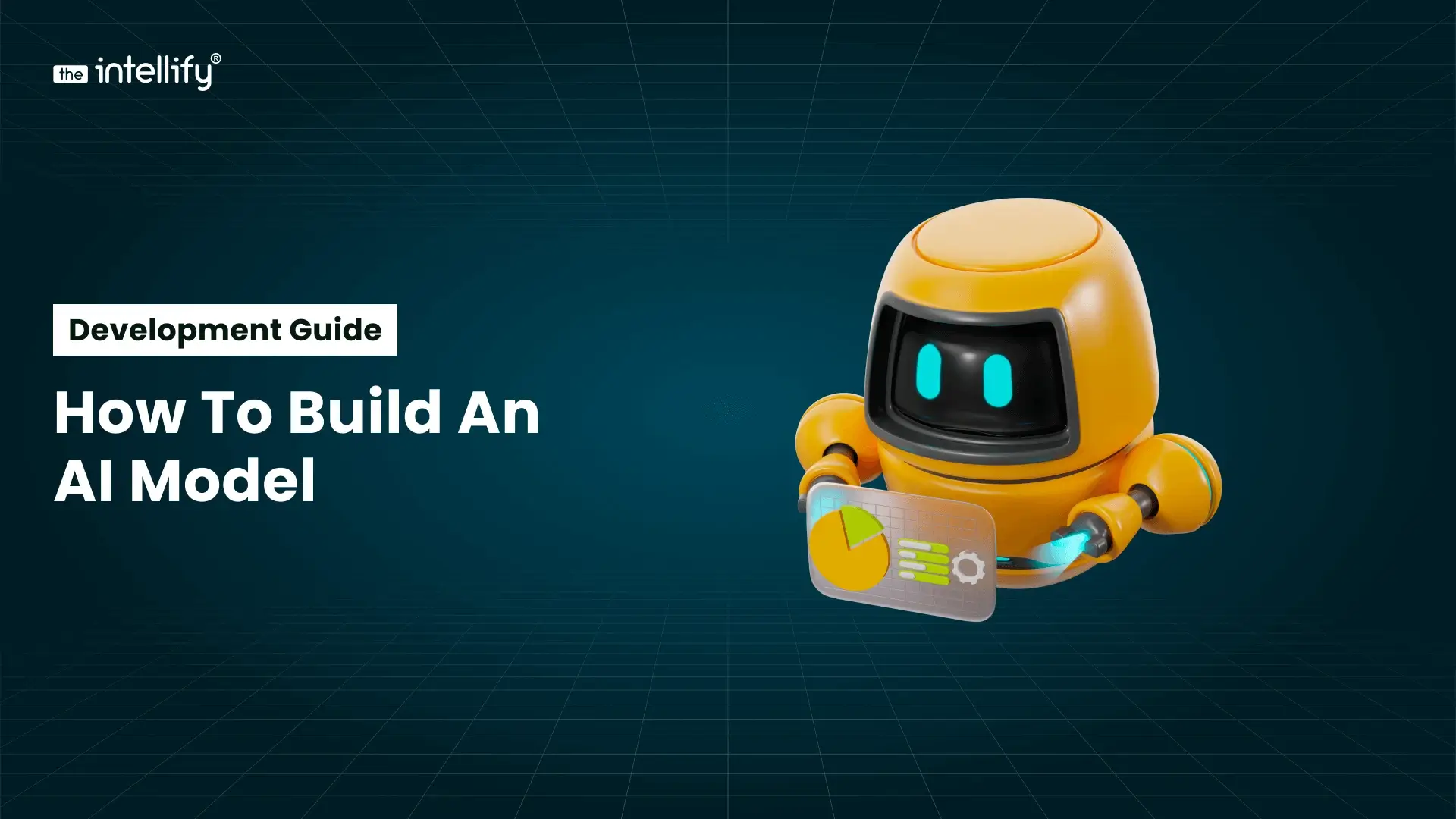
Summary
This blog offers a clear guide to AI model development in 2025, explaining what AI models are, how they work, and the process of building them. It also covers costs, challenges, and industry use cases, while showing how The Intellify helps businesses create reliable and scalable AI solutions.
Artificial Intelligence (AI) has moved from being a futuristic concept to a powerful business reality. In 2025, companies of all sizes are investing in AI model development to streamline operations, improve decision-making, and create personalized customer experiences. From chatbots and fraud detection to predictive healthcare and autonomous vehicles, AI models are shaping the way industries work today.
But building an AI model is not just about coding. It requires a mix of data, algorithms, technology, and a clear strategy. If you’ve ever wondered how AI models are built, what types exist, how much they cost, and what challenges developers face, this guide will walk you through everything in simple terms.
What is an AI Model?
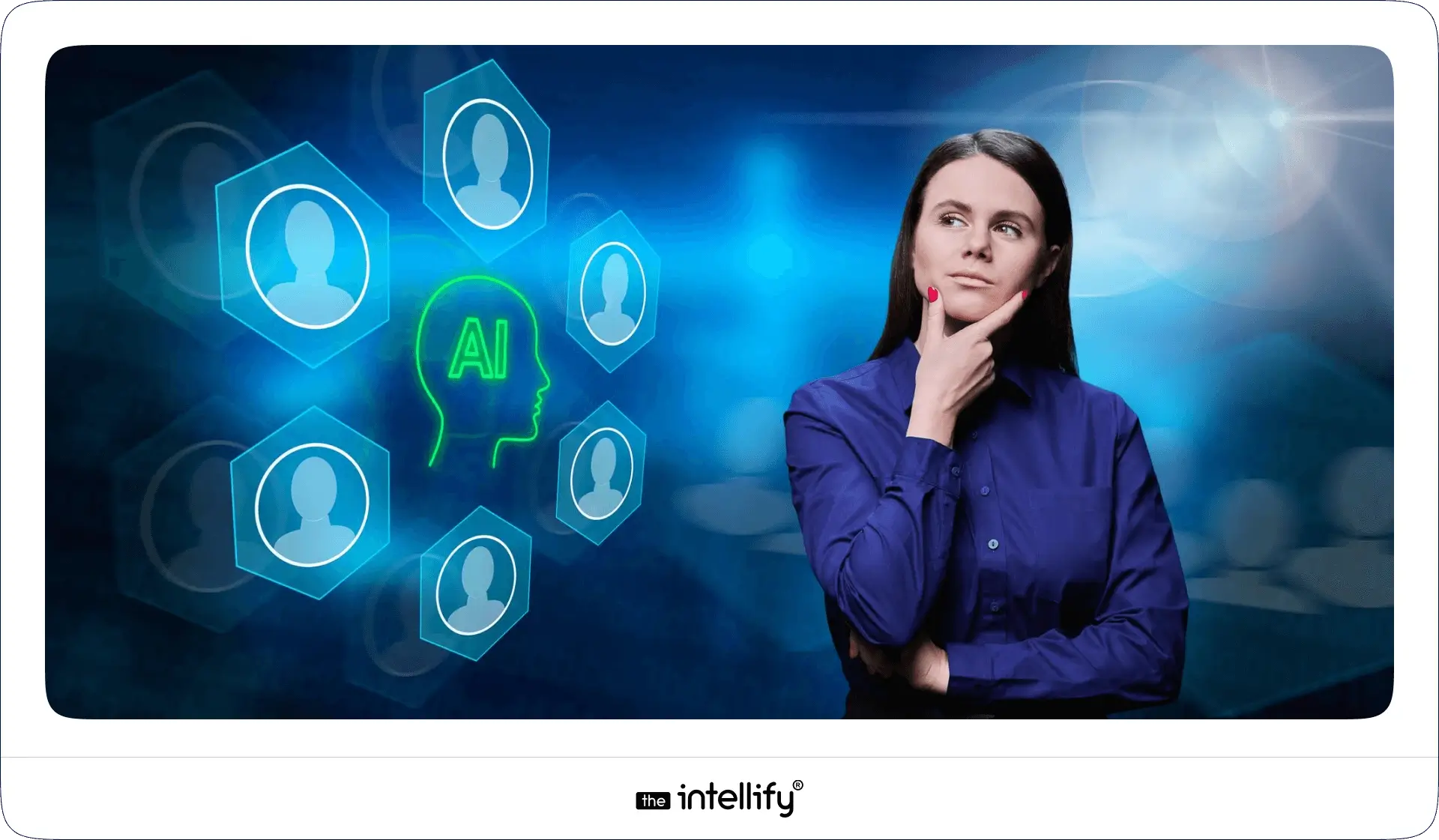
An AI model is a program trained to recognize patterns and make predictions or decisions without being explicitly programmed for every scenario. It learns from data and uses mathematical techniques to generalize knowledge.
Think of it like teaching a child: you show them many examples (data), they learn to identify from patterns, and then they can make decisions (predictions) even in new situations.
For example:
- Netflix’s recommendation engine is an AI model that predicts what you might like to watch
- Banks use AI models to detect fraudulent transactions.
- Healthcare apps use AI models to analyze medical images for early disease detection.
In short, an AI model is the “brain” behind AI applications.
Why AI Models Matter in 2025 (Market Trends & Applications)
The demand for AI models is exploding in 2025 because businesses realize that data-driven decision-making is no longer optional it’s essential.
- Market Growth: The global AI market is expected to reach over $800 billion by 2030, with AI models powering most of the innovation.
- Applications: From generative AI creating realistic content to predictive analytics helping retailers optimize inventory, AI models are everywhere.
- Competitiveness: Companies that fail to adopt AI risk falling behind competitors who use it for speed, efficiency, and personalization.
In short, AI models are not just tools, they are becoming a core part of business strategies.
Different Types of AI Models
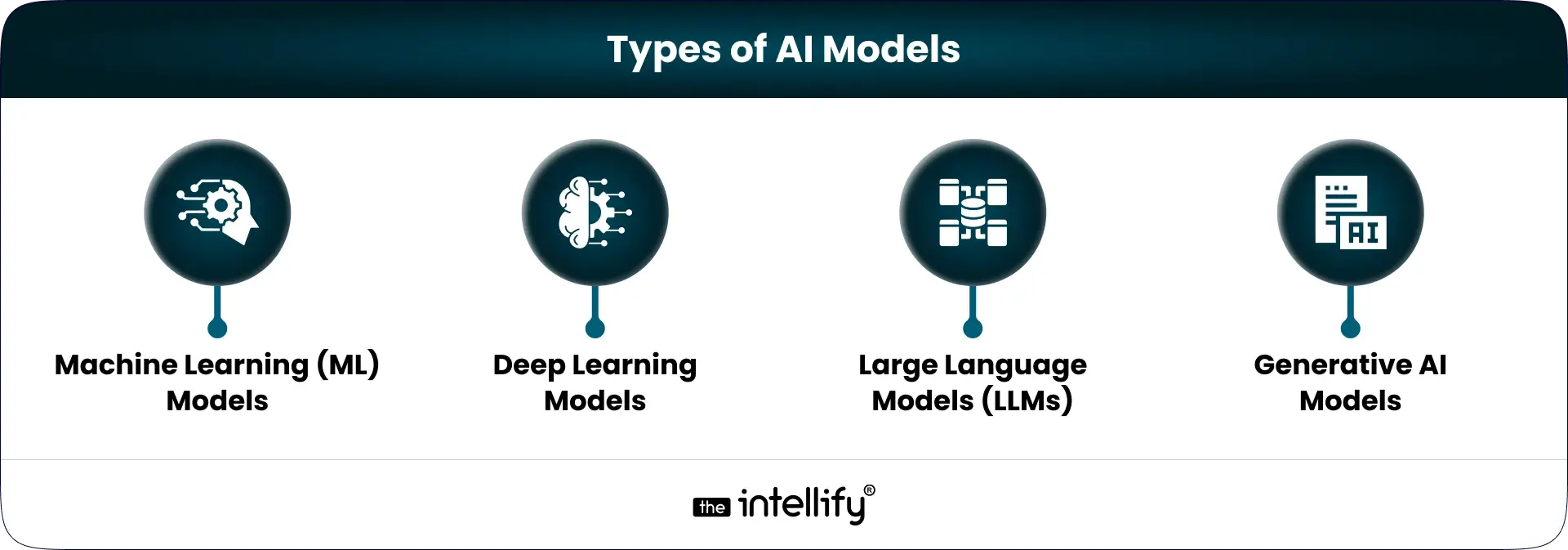
To better understand AI development, let’s look at the most common types of AI models businesses use in 2025:
1. Machine Learning (ML) Models
Focus on structured data like sales records, customer logs, and financial transactions.
Examples:
- Regression Models – Predict sales for the next quarter.
- Decision Trees – Identify which customer segment is most likely to buy.
2. Deep Learning Models
Handle complex, unstructured data like images, voice, and videos.
Examples:
- Convolutional Neural Networks (CNNs) – Used in facial recognition and medical imaging.
- Recurrent Neural Networks (RNNs) – Ideal for time-series data like stock price predictions.
3. Generative AI Models
Create new content (text, images, videos, or even code).
Examples:
- GPT-based models – Writing emails, blogs, or reports.
- Stable Diffusion/DALL·E – Creating AI-generated artwork.
4. Large Language Models (LLMs)
- Specialize in natural language understanding and generation.
- Examples: ChatGPT, Google Gemini, Anthropic’s Claude.
- Use cases: Customer service chatbots, content generation, language translation.
Each type has its strengths, and the right choice depends on the business problem you want to solve.
How Do AI Models Work? (Simplified Explanation)
At a high level, here’s how AI models function:
1. Input Data – Feeding large volumes of historical or real-time data.
2. Learning Phase (Training) – The model identifies patterns and builds knowledge.
3. Testing – The model is checked against new data to see if it works well.
4. Prediction/Decision – Once deployed, the model can make predictions or automate decisions in real-time.
For example:
In spam detection, the model learns the difference between spam and genuine emails by analyzing thousands of examples. It learns patterns like “free money” or unusual links. When a new email arrives, it can classify it correctly.
AI Model Development Process: Step-by-Step
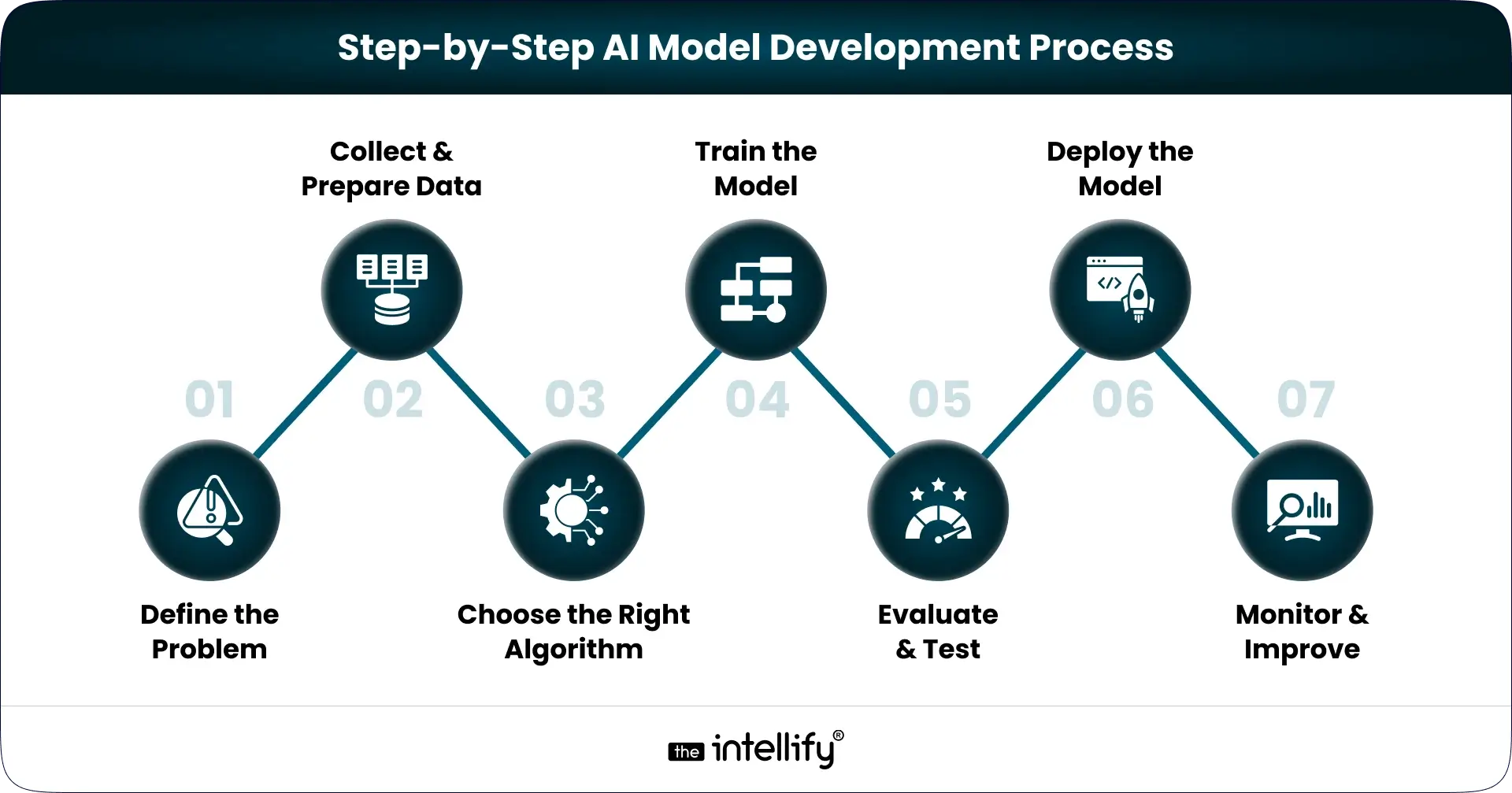
Building an AI model in 2025 requires a systematic approach. Here’s a simplified step-by-step guide:
1. Define the Problem
Start by identifying the business problem you want to solve. For example:
- What do you want the model to solve?
- Do you want to predict customer churn?
- Do you need an image recognition model for defect detection?
- Are you predicting sales, detecting fraud, or improving customer support?
A clear problem statement avoids wasted effort.
2. Collect & Prepare Data
AI models are only as good as the data they are trained on. This includes:
- Collect large volumes of structured and unstructured data..
- Cleaning the data (remove duplicates, errors, missing values).
- Labeling data for supervised learning (e.g., tagging images as “cat” or “dog”).
3. Choose the Right Algorithm
Algorithms are the foundation of AI models. Selection depends on:
- Type of data (structured vs. unstructured).
- Problem type (classification, regression, clustering, etc.).
4. Train the Model
The algorithm is fed data, and it “learns” by adjusting weights to minimize errors. The more quality data, the better the training.
5. Evaluate & Test
Use metrics like accuracy, precision, recall, and F1 score to check model performance. If it fails, tweak parameters or try another algorithm.
6. Deploy the Model
Once validated, the model is integrated into real-world systems, such as apps, dashboards, or automated workflows.
7. Monitor & Improve
Models degrade over time as data changes (called model drift). Continuous monitoring ensures relevance and accuracy.
Key Tools & Technologies for AI Model Development in 2025
Developers now have access to advanced platforms that make AI development faster:
- Frameworks & Libraries: TensorFlow, PyTorch, Keras, Scikit-learn.
- Cloud Platforms: AWS SageMaker, Google Vertex AI, Microsoft Azure AI.
- AutoML Tools: H2O.ai, DataRobot, RapidMiner for automated model creation.
- Generative AI APIs: OpenAI, Anthropic, Cohere for text and content generation.
- MLOps Platforms: MLflow, Kubeflow for model lifecycle management.
These tools reduce complexity and allow businesses to experiment without building everything from scratch.
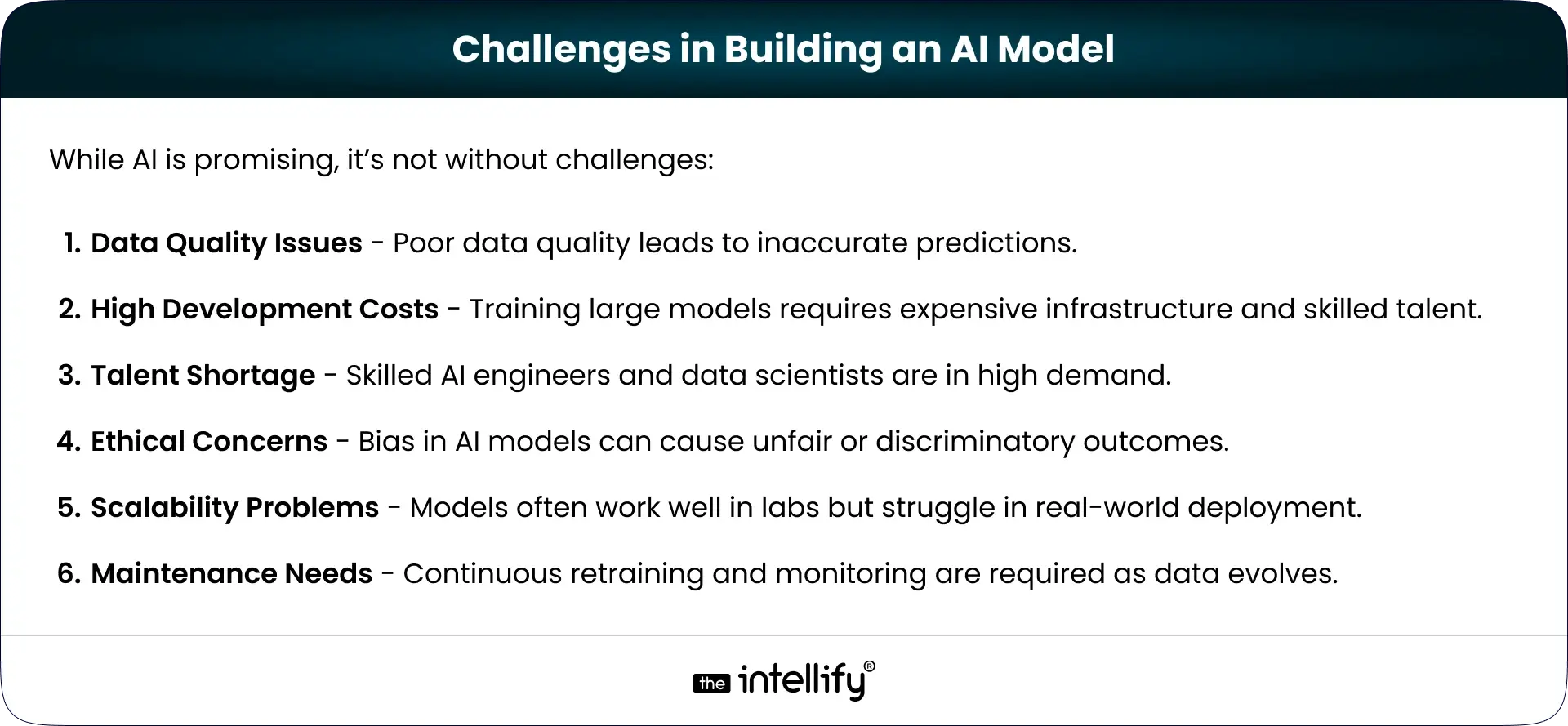
Best Practices for Successful AI Model Development
To overcome challenges, follow these best practices:
- Start small with a pilot project before scaling.
- Use diverse, unbiased datasets to reduce risks.
- Collaborate with domain experts (finance, healthcare, etc.).
- Ensure explainability so users trust AI decisions.
- Monitor ethical and legal compliance (GDPR, HIPAA).
- Invest in MLOps for streamlined deployment and monitoring.
How Much Does It Cost to Develop an AI Model?
Costs vary depending on complexity, data needs, and deployment scale. In 2025, typical ranges are:
- Simple AI Model (basic ML): $20,000 – $50,000
- Intermediate Model (deep learning, custom datasets): $50,000 – $150,000
- Advanced AI Model (LLMs, generative AI, enterprise scale): $200,000 – $500,000+
Factors influencing cost:
- Data Collection & Labeling – High-quality datasets are expensive.
- Infrastructure – GPU/TPU cloud usage costs can skyrocket.
- Talent – Experienced AI engineers demand high salaries.
- Ongoing Maintenance – Models need retraining and updates.
*Startups often reduce costs by leveraging cloud AI services and pre-trained models.
Industries Using AI Models in 2025 (with Examples)
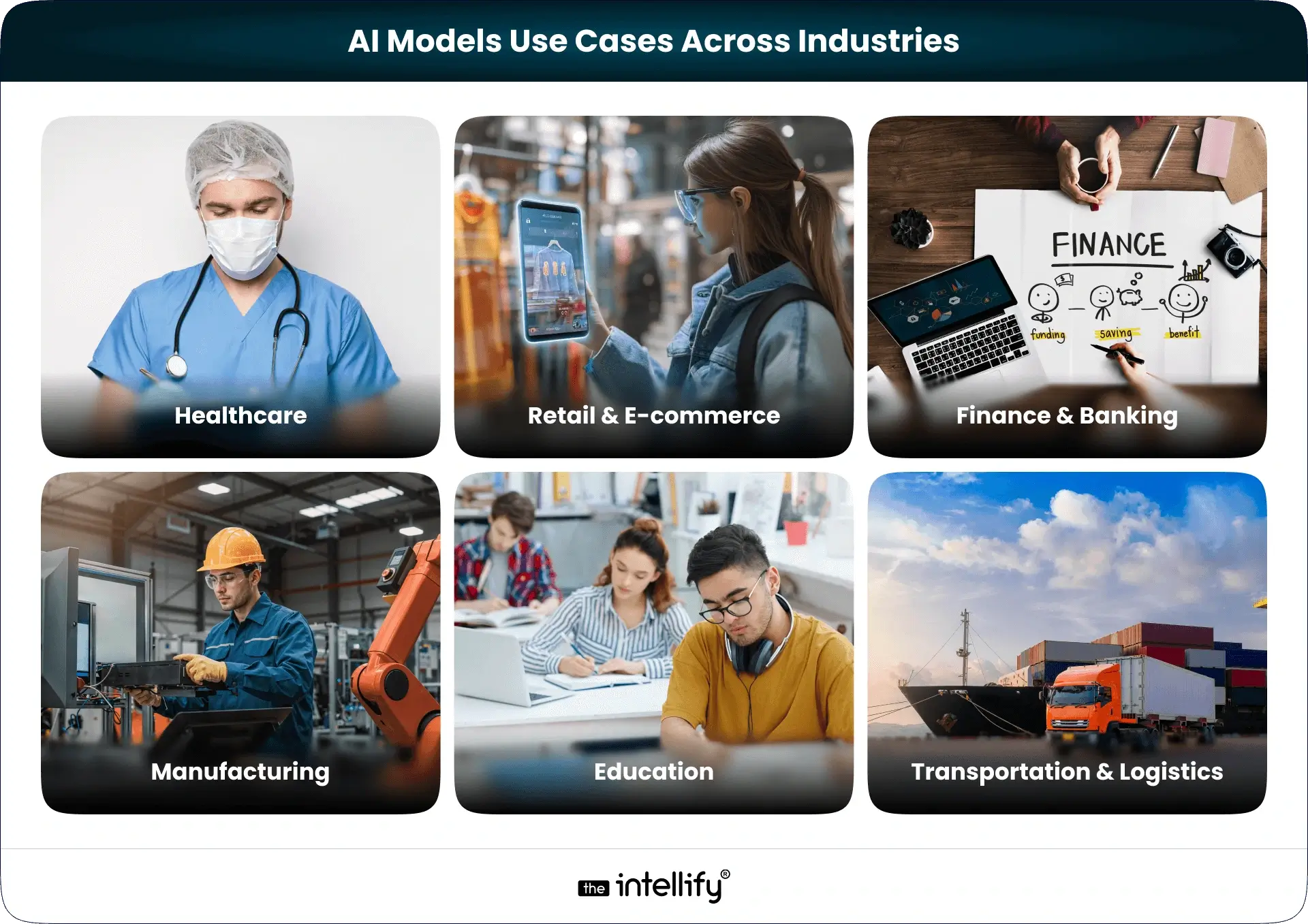
AI models are versatile and have industry-wide applications:
- Healthcare: AI predicts patient risks, speeds up drug trials, and assists in radiology.
- Retail & E-commerce: Personalized shopping experiences, demand forecasting, and chatbots.
- Finance & Banking: Fraud detection, robo-advisors, and credit risk assessment.
- Manufacturing: Predictive maintenance, automated defect detection, and smart supply chains.
- Education: Adaptive e-learning, plagiarism detection, and AI tutors.
- Transportation & Logistics: Route optimization, autonomous driving, and warehouse automation.
AI models are becoming the backbone of digital transformation across industries.
Why Choose The Intellify for AI Model Development?
At The Intellify, we specialize in delivering end-to-end AI model development tailored to your business goals.
- Expertise: 10+ years of experience in AI, ML, and automation solutions.
- Custom Solutions: Models tailored to your industry’s needs.
- End-to-End Services: From ideation and data collection to deployment and monitoring.
- Scalable Architecture: Future-ready solutions that grow with your business.
- Ethical AI Practices: Transparent, explainable, and bias-aware models.
- Ongoing Support: Continuous retraining and updates for long-term accuracy.
With a proven track record across industries, The Intellify is your trusted partner in making AI work for you.
In Conclusion
AI model development in 2025 is not just about building smart systems; it’s about creating business value through intelligence. From choosing the right type of AI model to training, deployment, and cost considerations, businesses must take a structured approach to unlock real value.
Yes, challenges exist, such as data quality, high costs, and ethical concerns, but with best practices and the right partner, AI can drive innovation and competitiveness.
If you’re planning to build AI models for your business, The Intellify can help you turn vision into reality with reliable, scalable, and future-ready AI solutions.
Frequently asked questions (FAQs)
1. What does “AI model development” really mean?
Answer: AI model development is the process of creating computer systems that can learn from data and make predictions, decisions, or classifications without being explicitly programmed for every scenario. For example, a model can analyze customer behavior to recommend products or detect unusual transactions in banking. At The Intellify, we focus on building AI models that aren’t just technically sound, but also practical, scalable, and aligned with real-world business outcomes.
2. How long does it take to build an AI model?
Answer: Timelines can vary. A basic model designed for a straightforward task may be completed in a few weeks, while complex models, especially those involving deep learning or natural language processing can take several months. The duration depends on factors like data availability, complexity of the task, and testing requirements. With The Intellify, we define clear project milestones, so you always know the progress and expected delivery.
3. How much data do I need to train a model?
Answer: The amount of data required depends on the type of AI model and the task. Simpler models, such as basic classifiers, may only need a few thousand well-structured records. More advanced models, like image recognition systems or generative AI, typically require much larger datasets. The Intellify helps businesses evaluate their current data, fill in any gaps, and design a data strategy that ensures both efficiency and accuracy.
4. What’s the cost of building an AI model?
Answer: The investment for AI model development isn’t fixed, it varies by complexity, data needs, and infrastructure. As a broad estimate:
- Basic models may cost between $20,000-$50,000
- Advanced deep learning models can range from $50,000-$150,000
- High-end generative or enterprise AI solutions may go beyond $200,000
At The Intellify, we provide transparent pricing and customized solutions to ensure your budget is aligned with your AI goals.
5. Can I use existing models instead of building from scratch?
Answer: Yes, many businesses choose to fine-tune existing models, a process known as transfer learning. This approach reduces both time and costs while still delivering strong results. For instance, pre-trained models in computer vision or language understanding can be adapted for your specific use case. The Intellify specializes in selecting the right balance between pre-built AI and custom solutions, ensuring maximum ROI for your business.
6. How do you make sure the model is fair and safe?
Answer: AI models must be unbiased, explainable, and safe to use. At The Intellify, we adopt a responsible AI approach: carefully selecting training data, identifying and reducing bias, and implementing monitoring systems that explain how predictions are made. This ensures your AI solution builds trust among users, stays compliant with regulations, and delivers decisions you can stand behind.

Written By, Jalaj Shah
The COO and Co-Founder of The Intellify. Jalaj enjoys experimenting with new strategies. His posts are fantastic for businesses seeking innovative development ideas. Discover practical insights from his engaging content.
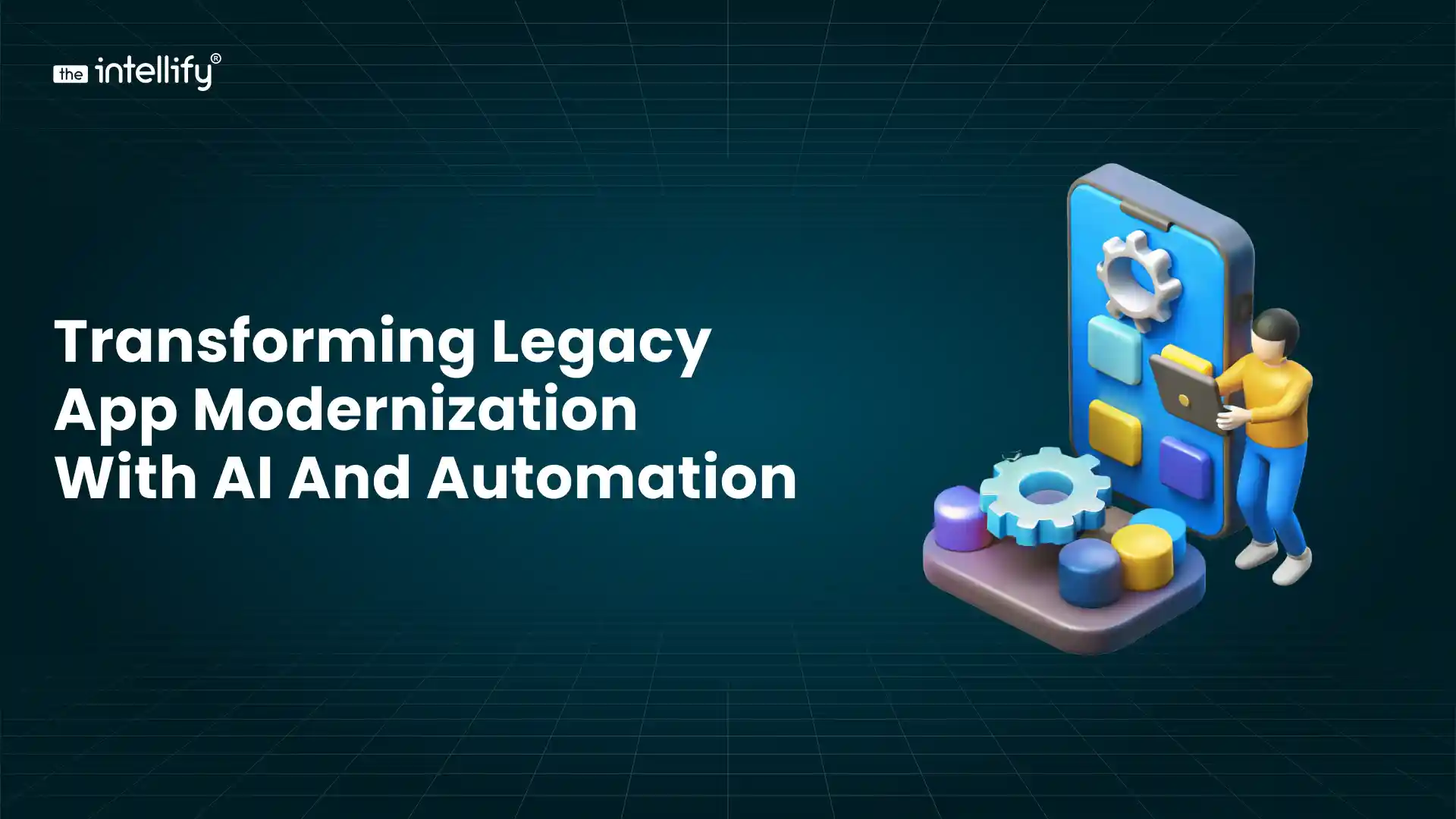

Transforming Legacy Application Modernization with AI and Automation
Summary: Legacy Application Modernization helps businesses upgrade outdated systems while maintaining operational stability. Many enterprises face technical debt, scalability challenges, and security risks that limit growth. By combining AI-driven automation with structured modernization strategies, organizations can improve performance, strengthen compliance, and enhance user experience. The blog also covers legacy mobile app modernization, industry use cases, […]
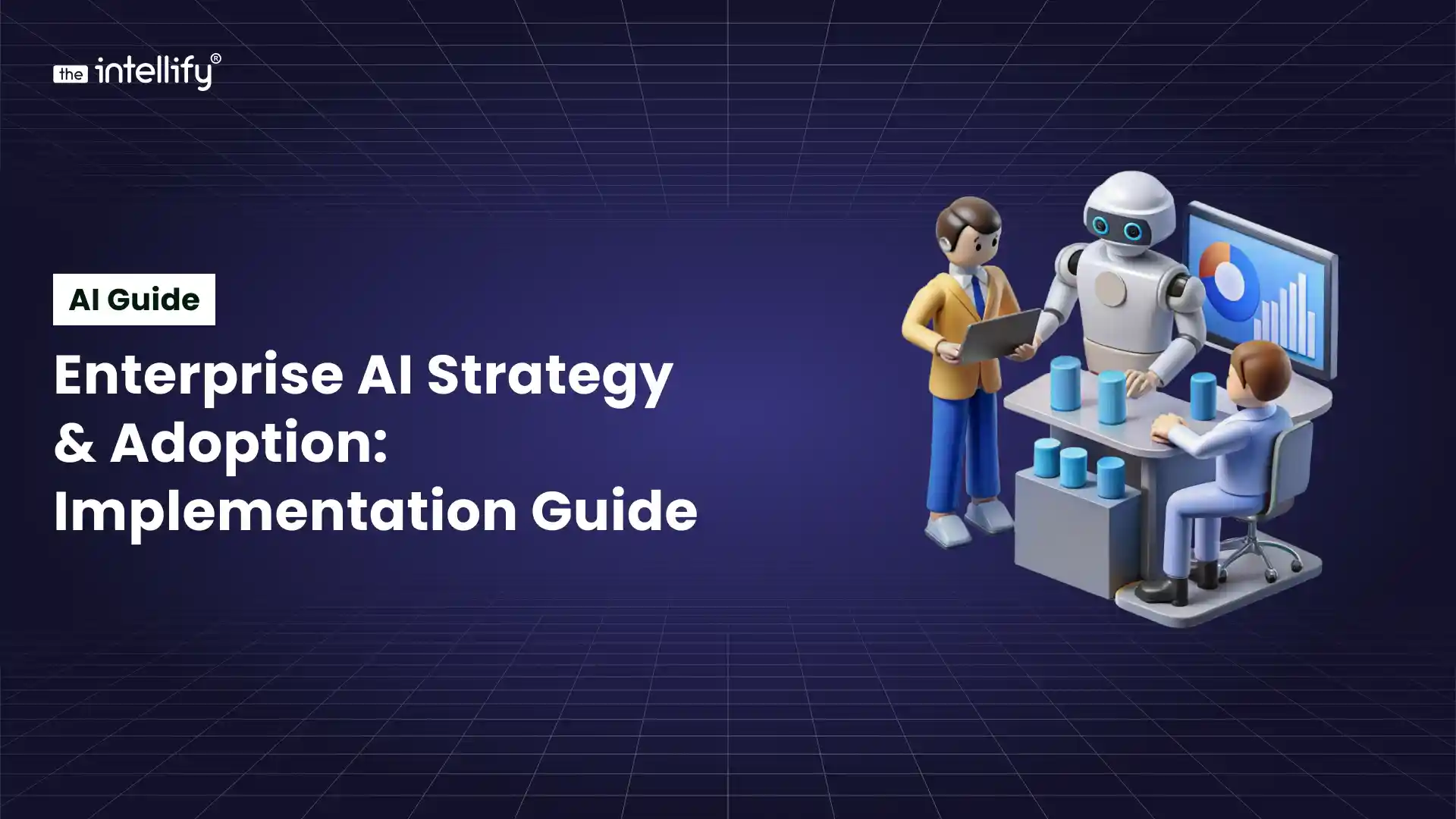

Enterprise AI Strategy & Adoption: Step-by-Step Implementation Guide
Summary: In today’s fast-paced business environment, enterprise AI is no longer just a buzzword; it’s become essential. Its potential to reshape operations, enhance decision-making, and drive efficiency is making AI a crucial part of organizational strategies around the globe. In this guide, we’ll explore how businesses can methodically adopt AI, from crafting a solid strategy […]
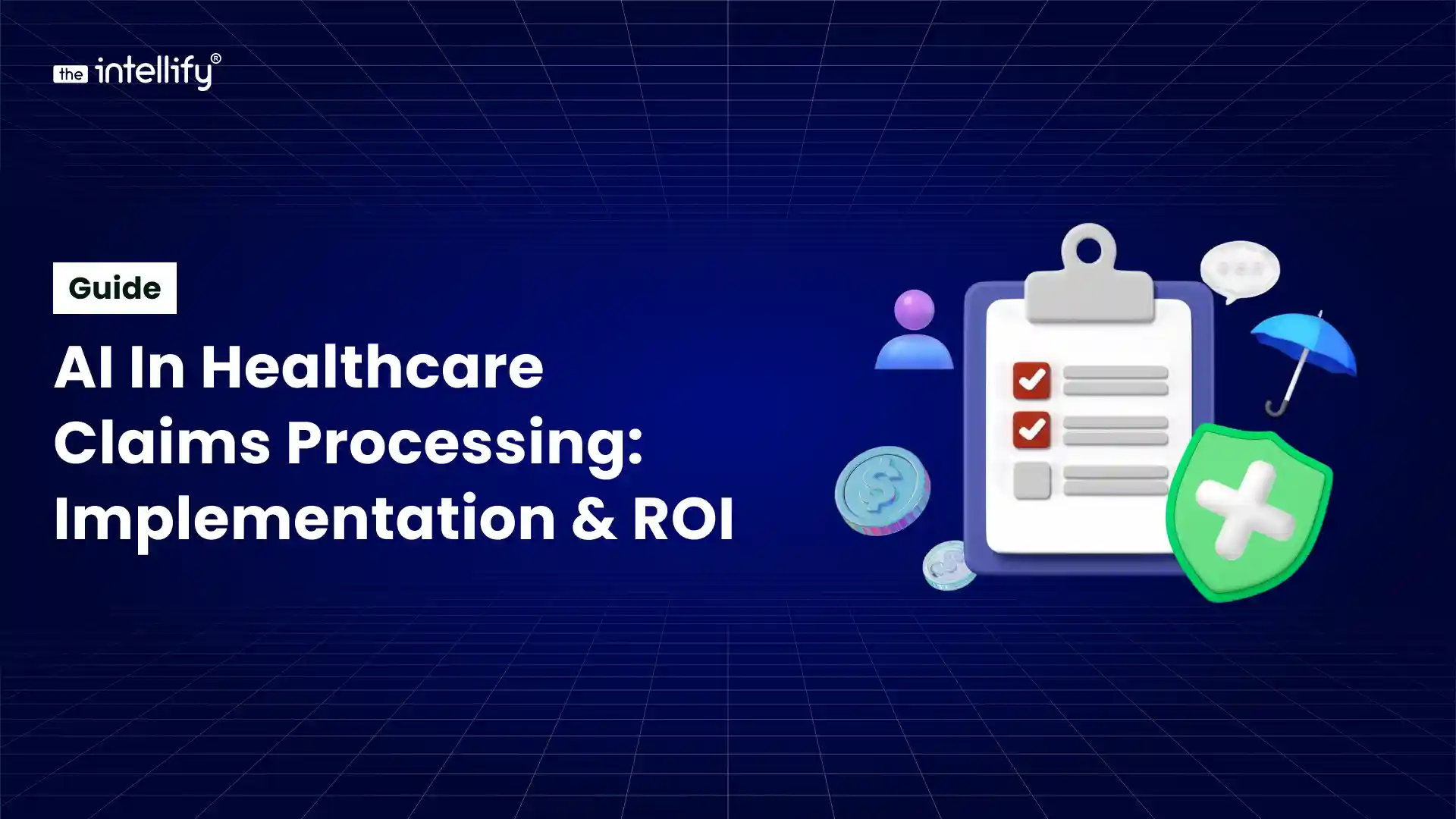

AI in Healthcare Claims Processing: A Practical Implementation & ROI Guide
Summary: Healthcare claims processing is often slow, manual, and prone to costly errors. This blog breaks down how AI in healthcare helps reduce denials, speed up reimbursements, and improve revenue cycle performance. You’ll see how AI supports each step of the claims process, what benefits providers and insurers can expect, and what it takes to […]


Transforming Legacy Application Modernization with AI and Automation
Summary: Legacy Application Modernization helps businesses upgrade outdated systems while maintaining operational stability. Many enterprises face technical debt, scalability challenges, and security risks that limit growth. By combining AI-driven automation with structured modernization strategies, organizations can improve performance, strengthen compliance, and enhance user experience. The blog also covers legacy mobile app modernization, industry use cases, […]


Enterprise AI Strategy & Adoption: Step-by-Step Implementation Guide
Summary: In today’s fast-paced business environment, enterprise AI is no longer just a buzzword; it’s become essential. Its potential to reshape operations, enhance decision-making, and drive efficiency is making AI a crucial part of organizational strategies around the globe. In this guide, we’ll explore how businesses can methodically adopt AI, from crafting a solid strategy […]


AI in Healthcare Claims Processing: A Practical Implementation & ROI Guide
Summary: Healthcare claims processing is often slow, manual, and prone to costly errors. This blog breaks down how AI in healthcare helps reduce denials, speed up reimbursements, and improve revenue cycle performance. You’ll see how AI supports each step of the claims process, what benefits providers and insurers can expect, and what it takes to […]
0
+0
+0
+0
+Committed Delivery Leads To Client Satisfaction
Client Testimonials that keep our expert's spirits highly motivated to deliver extraordinary solutions.


















